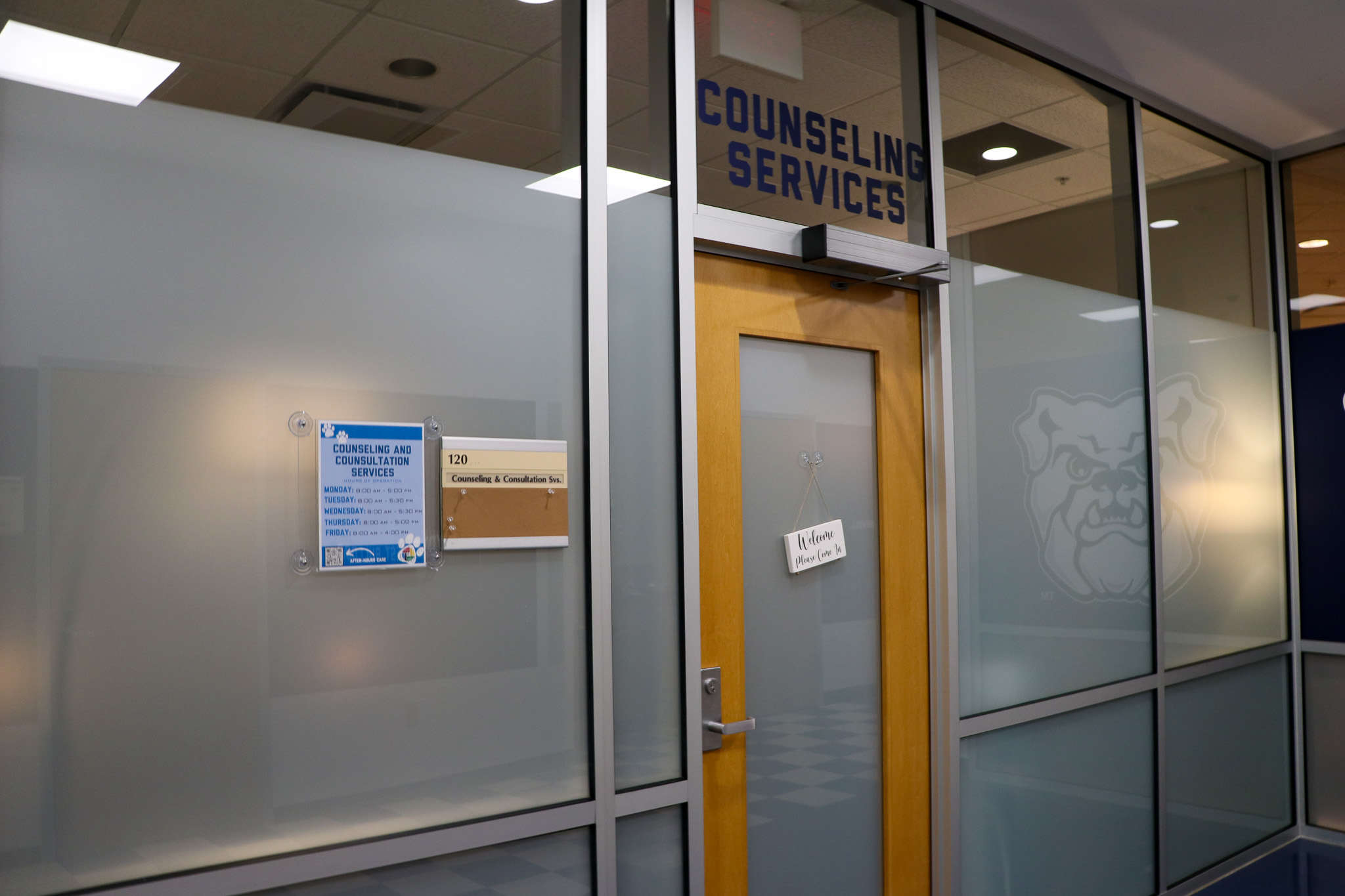Isn’t the welcome sign welcoming? Photo by Natalie Goo.
SARA CAINS | OPINION COLUMNIST | scains@butler.edu
Asking for help can be difficult. Many people often feel as though their problems are not enough to seek help, but that is simply not true. Feelings of stress, anxiety, depression and more can arise quickly, especially in college, where we feel as though all the pressure is on us to maintain academic success and a social life.
Even as a first year, this stress weighs on me every day. Part of it is because college is new, and the other part is that I don’t know who I am yet. But I am not ashamed or scared to ask for help, even when it is hard. It is particularly difficult when the resources offered are made to seem inaccessible and unhelpful.
Butler’s Counseling and Consultation Services (CCS) has gained a reputation for being unaccommodating for students’ four years.
Sophomore criminology-psychology major Morgan Purvis feels uninformed about CCS’s availability as well as what issues they treat.
“I’m afraid that they’re going to tell me my problems aren’t real,” Purvis said. “Also, I don’t know how booked they are, and I feel like other people have worse problems than I do, which I know is normal in cases of trauma. I really just don’t know much about CCS, either.”
The fear of being rejected is terrifying, and it is also difficult to trust a service with no prior information. Purvis said that she’s never seen a flier or even an email from the counseling services themselves — only emails from Health Services. Emails from Health Services are only helpful when a student is dealing with an acute illness or an injury, which is helpful for providing information on physical health, not necessarily mental health.
Sophomore political science major Claire Shaffer took advantage of Butler’s counseling services during their first year. They said that they generally liked the services, but did provide a theory as to why some students find Butler’s counseling services unsuitable for them.
“The problems I had were general problems I have with every other therapist,” Shaffer said. “Being a person of color and mainly only seeing white therapists can be a struggle. My therapist was fine, but I definitely think [CCS] can try and work more diversity into their clinics.”
Shaffer also added that they were under the impression that students could only visit CCS for six to eight weeks, before stopping counseling or finding a different provider.
When someone first signs up for counseling, they have to do an intake call for scheduling. In this call, CCS mentions that they have a standard session timeline of six to eight weeks. This could be why students think the therapy services at Butler are not suited for their four years at Butler. It can be hard enough to open up to a stranger who doesn’t know your experiences, much less one you’re only talking to for six to eight weeks.
Keith Magnus, the director of Counseling and Consultation Services, tried to debunk some of these rumors.
“If you’re here as a first-year student, come use our service,” Magnus said. “And as a sophomore, junior, senior, [if] something comes up and you want to come back in, come back in. You are totally eligible to use it for all four years.”
But to be transparent, Magnus also explained that CCS has historically been short-staffed. Magnus mentioned that two years ago there was a waitlist for weeks, which could have led to the rumors we hear today. But fear not — as of this fall — they do not have a waitlist and are on track with seeing students.
“Two years ago with the [client] waitlist, there were only three staff clinicians. Now there are five,” Magnus said. “We are still full and busy, so we would like another set of hands, but adding two more staff was super helpful.”
Magnus also shared an interesting note about how across the country, college counseling centers are not being considered as viable of a job option for clinicians.
“Mainly in this country, there is a shortage of college campus mental health professionals,” Magnus said. “[This is] mainly because of the pay. You can make more in most [other] settings as a mental health professional. I like this setting, so it’s worth it to me. But I can see pretty young professionals, how it doesn’t add up financially. Until they pay us better, I understand it.”
Magnus also provides insight into who and what CCS can and cannot treat because of what they can logistically handle.
“Occasionally we have students come in who have, for instance, a serious addiction who need more than once a week therapy,” Magnus said. “Just like if you walk into Health Services and you have cancer, you’re not going to get your cancer treatment there. But in large, 90% of students were able to be seen. But there is a small percentage that, like I said, it’s not something under our roof, but let us help you get help with [it].”
While this may be disheartening to some students, it is clear that the CCS team has Butler’s students’ best interests in mind.
We all can do better on communicating with each other. There is always room to grow, especially when a service’s purpose is to better the lives of people. But in the meantime, recognize that CCS is working with what Butler is providing them. They want to help students as best they can, and they are always looking for new ways to make the experience better.
From my experience with therapy, it can be tiresome to find the right person and have your needs fulfilled. Hopefully, as time passes, CCS at Butler can accommodate students and get a hold on spreading better information. Ultimately, what’s most important is that they are here to help you. It never hurts to ask for help.



